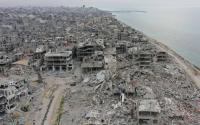by Rasna Warah12 May 2009www.zcommunications.org/znet/viewArticle/21438Development, as in Third World Development, is a debauched word, a whore of a word. Its users can't look you in the eye. - Leonard Frank, "The Development Game"[1] The death of development Recently, development assistance and aid to Africa has come under attack from the most unlikely quarters - the Africans themselves. The question of whether aid is good or bad for Africa has been tacked by those on both the political right and the political left. Dambisa Moyo's recently-published book Dead Aid presents the perspective of a Zambian-born financial expert with experience working for Goldman Sachs and other Western-based financial institutions. She argues for the phasing out of aid altogether and for making African markets more efficient to promote growth and reduce poverty. For her insights, she was named among TIME magazine's 100 most influential people this month. Missionaries, Mercenaries and Misfits (AuthorHouse UK, 2008) the anthology I edited, and which preceded Moyo's book by nine months (but with much less fanfare) also argues for less aid but by using a different ideological argument. The mess we Africans find ourselves in, argue the mainly East African authors, is not because our markets are not efficient, but because the policies and conditionalities (including liberalisation, privatisation and free markets) imposed on us by Western donors and multilateral organisations benefited a few at the expense of the majority. In fact, these policies, particularly those imposed by the Bretton Woods institutions - pillars of the Washington Consensus - are largely to blame for Africa's growing poverty and inequality. While not offering prescriptions, the book does show the failings of the development industry in Africa, through essays penned by people working within the industry who have first-hand experience, either as implementers of aid projects, as beneficiaries or as observers. My own experience within the development industry sowed the seeds of doubt way back in 2002 during an interview that I was conducting with Mberita Katela, a woman living in Laini Saba, the densest and poorest section of Nairobi's Kibera slum, who earned an average daily income of 50 Kenya shillings (less than the proverbial dollar-a-day) selling vegetables and cigarettes to her neighbours. I had gone to Kibera to do what they call a "qualitative time-space analysis" of how slum dwellers spend their time and how much physical space they occupy while carrying out their daily chores. This activity was part of a larger and much broader global slum analysis being carried out by the United Nations Human Settlements Programme (UN-HABITAT), where I worked at the time. As I sat on one of two small stools in Mberita's tiny wattle, daub and tin shack - which was only marginally bigger than my bathroom at home - I found myself asking her the most intimate details about her life, questions that I myself would not have entertained: what she ate for breakfast, how many people she shared her shack with and, most important of all, where she defecated. Through this exercise, I found out that she shared one stinking pit latrine with dozens of her neighbours and that the latrine was located less than ten metres from her shack, which she shared with her daughter and two grandchildren. Needless to say, the stench of raw sewage permeated the air within and around her neighbourhood. Mberita's story - or rather, the state of her living conditions - was published in a UN-HABITAT publication[2], and was subsequently picked up by the American author and urbanist Mike Davis, who used parts of the story in his provocative book Planet of Slums[3]to illustrate the dehumanising living conditions experienced by the world's urban poor. Meanwhile, Mberita has remained oblivious of the fact that her name now appears in a book, a magazine and in cyberspace (a Google search in February 2007 yielded 9 results). The publication of her story had little or no impact on her living conditions[4]; the most it did was create what development workers like to call "awareness" among some people and gained me a few Brownie points within the development fraternity. I had turned her into one of those people who, in the words of British columnist A.A. Gill, "slip through the cracks of good intentions" to become "slices of pie chart and exclamations". [5] I was sub-consciously doing what many people in the so-called development industry do: I was objectifying her, seeing her as part of a problem that needed to be solved so that she could be neatly compartmentalised into a "target group" category. This allowed me to perceive her as being "different" from me and bestowed on her an "otherness" that clearly placed her as my inferior, worthy of my sympathy. [6] Like most professionals working in the development industry, I had failed to see that my work and the structures within which I operated were self-serving. Since the birth of the United Nations in 1945, the notion of development has become a sacred cow within the international community, one that can not and must not be questioned. Not too long ago, when a dissident intellectual named Ivan Illich questioned the very idea of development (which he even had the audacity to refer to as "planned poverty"), he was quickly dismissed as a provocateur.[7] His ideas, however, were propagated by various critics of development, including the environmentalist and author Wolfgang Sachs, who claimed that "the idea of development stands like a ruin in the intellectual landscape" and that "delusion and disappointment, failures and crime have been the steady companions of development".[8] Sachs even went as far as saying, "It is not the failure of development that has to be feared, but its success." These critics argued that development is more than a socio-economic endeavour; rather, it is "a perception that models reality, a myth that comforts societies and a fantasy that unleashes passion"[9]. Missionaries, Mercenaries and Misfits shows how development can be easily subverted by vested interests - be they donors, NGOs or governments. For instance, one of the authors, Kenyan performance artist Bantu Mwaura, argues that theatre in Kenya has totally been consumed by development issues that concern donor communities; hence the emergence of what he calls "Aids-driven theatre" which often has an underlying HIV/Aids theme. This obsession with donor-focused agendas has led to the death of local, indigenous theatrical performances and practices. Professor Issa G. Shivji of Tanzania shows how policy-making, an important aspect of sovereignty, has been wrenched out of the hands of African governments by donors, relegating the former to mere beneficiaries rather than active participants in their own country's development agenda. Firoze Manji, editor of Pambazuka News, makes a strong argument against what he calls "the depoliticisation of poverty", in Africa which fails to address historical and other injustices that perpetuate poverty and conflict on the continent. African governments also come under scathing attack in many of the essays in this anthology. Kenyan journalist Parselelo Kantai shows, for instance, how post-colonial governments have facilitated, if not encouraged, the underdevelopment of the Maasai community in Kenya. The arguments of the authors revolve around three basic premises:1) That the development business and all those those who work for it are motivated by the need to impose new systems of domination on people of the Third World - in other words, that development is just another way that colonialism can be perpetuated without being labelled oppressive;2) That development models, such as those imposed by the World Bank, the International Monetary Fund and other donor agencies, favour the rich at the expense of the poor and are, therefore, instrumental in perpetuating poverty in the so-called developing world; and3) That the worldview, intentions and mindset of development practitioners are paternalistic, arrogant and totally ignorant of the reality of poor people's lives. The notion of "development" is also rejected because it is closely associated with "Westernisation". Very few people in the development industry wonder why the biggest recipients of foreign aid, such as Ethiopia and Tanzania, remain among the most impoverished countries in the world. Failures of aid are largely attributed to corrupt governments, whose excesses can be curbed through what the World Bank terms as "conditionalities". No-one thinks of eliminating aid altogether. The small circle of academics and mavericks who question the effectiveness of aid and development assistance are by and large not taken seriously by the international development community. Their ideas may appear in some text books or speeches; they might even provoke discussion and debate within post-graduate courses and seminars, but they are seen as aberrations, lone voices in a Bono-Bob Geldof-driven development industry that is convinced that the ingredients of lifting the wretched of the earth out of poverty include higher economic growth, liberalised markets, good governance, better-funded NGOs and, most important of all, more aid. Moyo has added to the debate, but I am afraid that given her total unflinching faith in markets as the ultimate solution, and her silence on issues of social justice, have not taken the debate far enough. But she rightly reports that many African countries are poorer now than they were in 1980, at the end of what was dubbed "the second UN Development Decade", despite being among the biggest recipients of official development assistance in the last 40 years.[10] Despite impressive economic growth rates in recent years, growth in most African countries has failed to trickle down to the poorest groups. In Nairobi, for instance - the city that hosts the UN agency charged with improving the lot of slum dwellers worldwide - slums have become worse places to live than they were three decades ago. In 1971, eight years after Kenya achieved independence, there were 50 informal settlements, or slums, in the city housing less than 200,000 people; today there are almost 200 slums in the city where an estimated 1.8 million people - more than half the city's population - live.[11] More than 60 per cent of sub-Saharan Africa's urban population lives in slums such as Kibera, where people like Mberita eke out an existence with no running water, no electricity, and no breathing space.[12] Although the growth of slums in African cities is the result of a variety of factors, including rapid urbanisation and the after-effects of the World Bank-IMF-led structural adjustment programmes of the late 1980s and 1990s, which reduced or eliminated subsidies on basic services in urban areas, their growth is also symptomatic of a deeper reality: without slums, many cities in Africa would not function. African cities rely on the relatively cheap labour provided by slum dwellers to man their factories, to construct buildings, to clean their streets and to generally make the economy grow. Slum dwellers, in turn, need the employment generated by cities to survive, and they need affordable housing (provided by slums) to be able to compete in a job market where labour is cheap and where rents for better housing are unaffordable. Ultimately, however, slums epitomise the failure of governance institutions and lack of effective trade unions and other mechanisms to ensure that the poor are less vulnerable. They will only stop growing when there is sustained political will to adopt an integrated, multi-sectoral approach, using government resources, to upgrade them and provide them with basic services and infrastructure at subsidised rates. Moreover, sustained economic growth will only have an impact on the poorest groups when it is linked to eliminating corruption, distributing resources more equitably and making housing more affordable for the poorest groups - a much more ambitious and risky endeavour that many African governments are not yet willing to undertake. In short, African countries need to develop the institutions and the human resources to sustain economic growth and to improve the living standards of the majority. But, as we have seen in many African countries, including Kenya, the development of efficient and effective institutions and human resources is hampered by none other than the largely corrupt African political elite - one of the biggest causes of underdevelopment in the region. Removing corrupt governments, reducing or eliminating aid dependency and putting in place just institutions and laws that will protect the majority and ensure that prosperity is equitably distributed are the only ways in which Africans can take charge of their own destiny and stop becoming mere spectators in the business of their own development. It is my sincere hope that the 21st century will herald the end of the so-called development industry as it exists now and give birth to a new era where poverty and underdevelopment are viewed through the prism of social justice rather than that of charity or aid. * This essay is adapted from the introduction by the author in the recently-published book, Missionaries, Mercenaries and Misfits (AuthorHouse UK, 2008). Notes
[1] Frank, Leonard (1997), "The Development Game", The Post-Development Reader, London and New York: Zed Books Ltd.[2] Warah, Rasna (2002), "Nairobi's Slums: Where Life for Women is Nasty, Brutish and Short", Habitat Debate, Vol. 8 No. 4, December.[3] Davis, Mike (2006), Planet of Slums, London and New York: Verso.[4] Mberita Katela's living conditions may not have improved, but she has been involving herself in various community activities since I last spoke to her. A newspaper report in March 2008 named her as the chairperson of an environmental initiative in Kibera called Ushirika wa Usafi Laini Saba.[5] Gill, A.A. (2005), "Eye Witness" Sunday Times magazine, 3 July.[6] Interview with Mberita Katela conducted by the author in March 2002.[7] Illich, Ivan (1997). In The Post-Development Reader (Eds. Rahnema, M. and Bawntree, V.), London and New Jersey: Zed Books.[8] Sachs, Wolfgang (Ed.) (1992) "Introduction", The Development Dictionary, London and New York: Zed Books.[9] Ibid.[10] UNDP (2005) Human Development Report 2005: International Cooperation at a Crossroads, New York.[11] Government of Kenya-United Nations Centre for Human Settlements (2001), "Nairobi Situation Analysis: Collaborative Nairobi: Slum Upgrading Initiative".[12] UN-HABITAT (2006), State of the World's Cities Report 2006/7, London and Sterling, VA: Earthscan.






